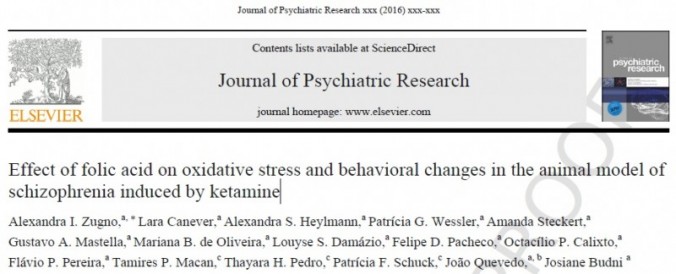Effect of folic acid on oxidative stress and behavioral changes in the animal model of schizophrenia induced by ketamine

Journal of Psychiatric Research, 2016, Pages 23–35
Alexandra I. Zugno, Lara Canever, Alexandra S. Heylmann, Patrícia G. Wessler, Amanda Steckert, Gustavo A. Mastella, Mariana B. de Oliveira, Louyse S. Damázio, Felipe D. Pacheco, Octacílio P. Calixto, Flávio P. Pereira,Tamires P. Macan, Thayara H. Pedro, Patrícia F. Schuck, João Quevedo, Josiane Budni.
Abstract: Recent studies have shown benefits for the supplementation of folic acid in schizophrenic patients. The aim of this study was to evaluate the effects of folic acid addition on adult rats, over a period of 7 or 14 days. It also sets out to verify any potential protective action using an animal model of schizophrenia induced by ketamine, in behavioral and biochemical parameters. This study used two protocols (acute and chronic) for the administration of ketamine at a dose of 25 mg/kg (i.p.). The folic acid was given by oral route in doses of 5, 10 and 50 mg/kg, once daily, for 7 and/or 14 days in order to compare the protective effects of folic acid. Thirty minutes after the last administration of ketamine, the locomotor and social interaction activities were evaluated, and immediately the brain structure were removed for biochemical analysis. In this study, ketamine was administered in a single dose or in doses over the course of 7 days increasing the animal’s locomotion. This study showed that the administration of folic acid over 7 days was unable to prevent hyper locomotion. In contrast, folic acid (10 and 50 mg/kg) administrated over a period of 14 days, was able to partially prevent the hyper locomotion. Our data indicates that both acute and chronic administrations of ketamine increased the time to first contact between the animals, while the increased latency for social contact was completely prevented by folic acid (5, 10 and 50 mg/kg). Chronic and acute administrations of ketamine also increased lipid peroxidation and protein carbonylation in brain. Folic acid (10 and 50 mg/kg) supplements showed protective effects on the oxidative damage found in the different brain structures evaluated. All together, the results indicate that nutritional supplementation with folic acid provides promising results in an animal model of schizophrenia induced by ketamine.
Mais informações: http://www.journalofpsychiatricresearch.com/article/S0022-3956(16)30120-0/abstract
28 de junho de 2016 às 17:40
 Newsletter
Newsletter  RSS
RSS 